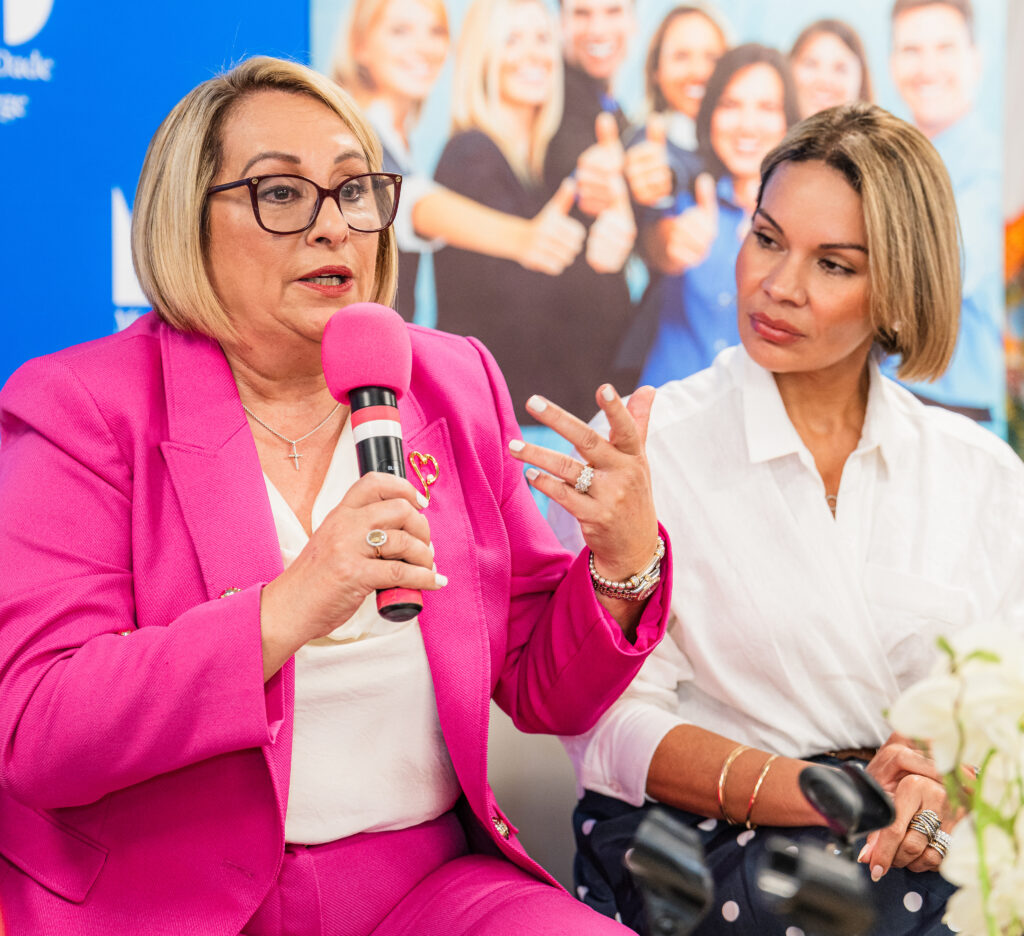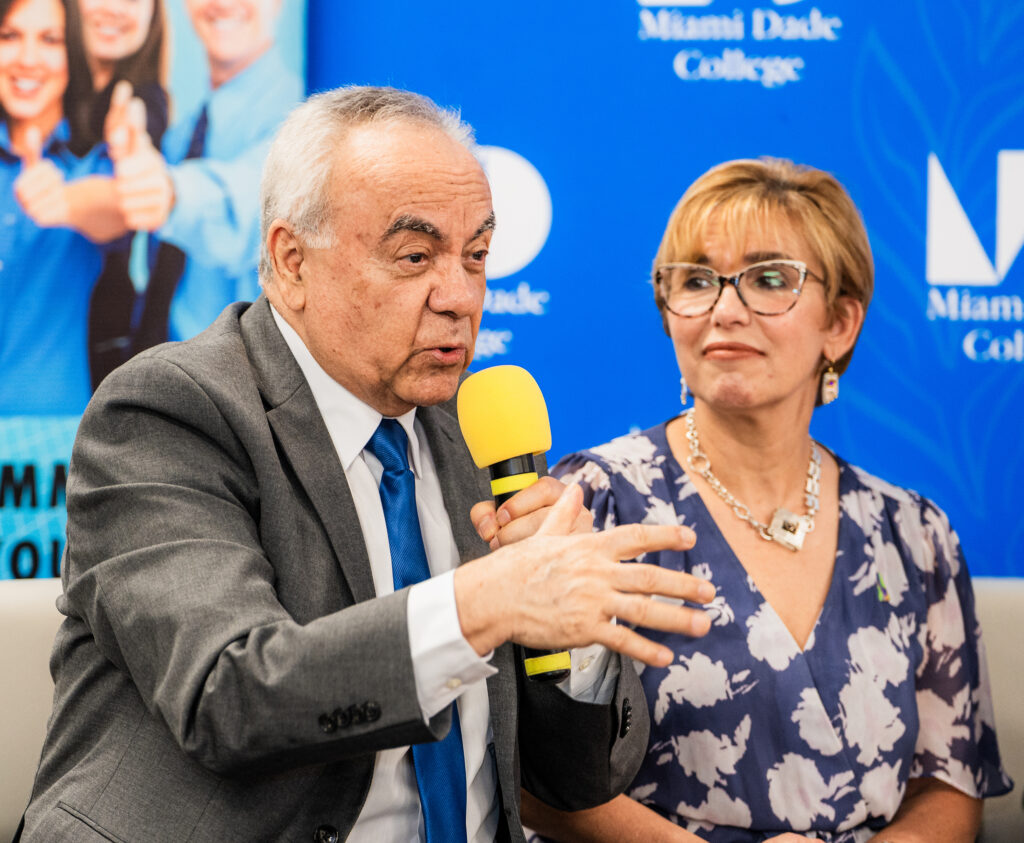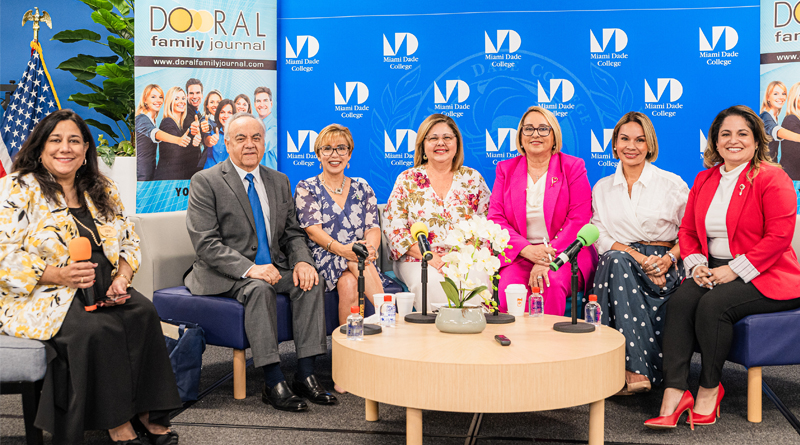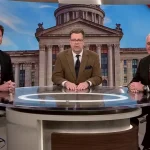By: Maria Alejandra Pulgar
The health and well-being needs of the growing Hispanic senior population in South Florida are undeniable, and as time goes by, education and preparation will make the difference in the golden years. Those were the main subjects discussed during the Health Care Forum on Aging organized by Doral Family Journal, that took place on May 22 at the Miami-Dade College West Campus.
This forum represented a valuable exchange of knowledge on the critical importance of preparedness, education, and mutual support in facing the complex challenges inherent in aging. The central message was clear: the proper dissemination of information about the resources available to cover the needs of the aging population, is the cornerstone for our senior Hispanic community to make timely decisions and be prepared for a future with quality of life.
Moderated by Dr. Trinidad Argüelles from MDC-West, the panel was composed by Mario Tapia, CEO of the Latino Center on Aging; Mercy Cabrera, Director of Sunshine Life and Health Advisors; Mireya Goni, Agent Advisor Washington National Insurance; Lupe Bruneman, Director of Advocate Health Advisors; Kathy Avila Regional Manager Advocate Health Advisors, and Sandra Ochoa, CEO Vemax Insurance. Their diverse areas of expertise provided an exceptional input to the approach related to the prevention and protection of the elderly, specifically in the Hispanic population.
The Urgency of Preparedness
The forum highlighted a demographic reality that demands our attention: population aging is a global trend, and in the United States, with a particular emphasis on the Hispanic population, the phenomenon is even more pronounced. The figures shared by Mario Tapia underscored the magnitude of the shift: “In this country, seven out of 10 seniors, 65 or older, are Hispanic, and it is the fastest-growing population.
“These data are not merely statistical; they are a call to action to adapt and strengthen our support and care systems, recognizing the specific needs of our older Hispanic community. There are not enough programs for the bilingual population. That’s why we must continue advocating for that” explained Tapia, who also hosts the weekly radio program “Para Mayores” on La Poderosa, to inform the senior Hispanic community about their issues and available resources.
All participants in the forum agreed on the importance of educating not only the elderly but all the population about the services available and how to access them. Preparedness, as repeatedly emphasized, is not an option but an urgent necessity.
Mireya Goni commented that those involved in the insurance field “have become advisors for our [Hispanic] community, because in our countries these resources are either nonexistent or work differently […] the acculturation process must begin at schools and colleges, where people learn to manage their finances and make decisions. Those [decisions about the financial future] are love decisions for yourself and for your family. When adults make good financial and preparation decisions, they help their families to support them later in life. And when younger generations get educated on the resources available for the elderly, they are more prepared to assist them in the future”

Sandra Ochoa complemented that comment stating that “education is happening in person, but the responsibility of the healthcare of the elderly is falling on their children or grandchildren’s shoulders. We need to use other resources (like social media) to reach out to the younger generations and provide them with the information they need”
And Kathy Avila added that she “still believe in the power of traditional methods like radio and press. The point is attacking all fronts. We have the gift of attracting and informing younger generations […] and where we see seniors struggling because they have not prepared, we send the messages needed to make a difference.”
These educational efforts for younger generations can happen at any stage, as Mercy Cabrera explained. She was invited once to do a presentation for a group of elementary students. “The children loved it. Talking about insurance does not need to be a boring theme. We learn something new every day and we need to take every opportunity to educate others about preparation.”
Lupe Bruneman added that “in our Hispanic culture we take care of our elders until the end” and counting with the financial resources for covering the associate costs of those years becomes fundamental. Unfortunately, not all people, especially Hispanics, know that Medicare does not cover Long-Term care and supplemental insurance is the solution. When the need arises, it is already late to get the coverage, and it can be anticipated. Having the knowledge and information about it makes a difference for the wellbeing of the whole family.
The role of the caregiver is irreplaceable. Recognizing that the care of seniors often falls on family members or friends highlights how a lack of resources, information, and support for them can lead to their physical and emotional exhaustion, directly affecting the quality of care.

Education to get Adequate Insurance on time
Mr. Tapia explained that the number of senior Hispanics in the US “is going to be 22 million in the next 30 years. We don’t see that they [the government] develop the programs according to the growth”.
As the population ages, the need for increased knowledge on these issues grows. The optimal age for an individual to get good rates and coverage with supplemental insurance for Long-Term care is between the mid 50’s and early 60’s. “By 65 it is too late to get the information,” said Kathy Avila.
“There are different types of insurances” explained Sandra Ochoa “You can start working on your life insurance since you are very young […] Before you turn 65, you have three months to get enrolled into the right [Medicare] plan. That’s the perfect time to find a good broker, someone that can come to you and someone that can really go over all your benefits and show you what are the alternatives that you have”.
Events like this Health Care Forum contribute to generate awareness and actions that will benefit the Hispanic community in South Florida, to help our seniors not only live longer but do so with dignity, security, and the quality of life they deserve. Together, through education and mutual support, we can build a stronger, more informed, and deeply committed community dedicated to the well-being of all its members.

Foro por la Salud del Adulto Mayor
Educación y Preparación para el Bienestar Futuro
Por: Maria Alejandra Pulgar
Las necesidades de salud y bienestar de la creciente población hispana de la tercera edad en el sur de Florida son innegables, y con el paso del tiempo, la educación y la preparación marcarán la diferencia. Estos fueron los principales temas tratados durante el Foro de Salud para el Adulto Mayor, organizado por Doral Family Journal, que se llevó a cabo el 22 de mayo en el Miami-Dade College West.
Este foro representó un valioso intercambio de conocimientos sobre la importancia crucial de la preparación, la educación y el apoyo mutuo para afrontar los complejos desafíos inherentes al envejecimiento. El mensaje central fue claro: la correcta difusión de información sobre los recursos disponibles para cubrir las necesidades de la población mayor es fundamental para que nuestra comunidad hispana de la tercera edad tome decisiones oportunas y esté preparada para un futuro con calidad de vida.
Moderado por la Dra. Trinidad Argüelles de MDC-West, el panel estuvo compuesto por Mario Tapia, Director Ejecutivo del Centro Latino sobre el Envejecimiento; Mercy Cabrera, Directora de Sunshine Life and Health Advisors; Mireya Goni, Asesora de Agentes de Washington National Insurance; Lupe Bruneman, Directora de Advocate Health Advisors; Kathy Avila, Gerente Regional de Advocate Health Advisors, y Sandra Ochoa, Directora Ejecutiva de Vemax Insurance. Sus diversas áreas de especialización aportaron una contribución excepcional al enfoque relacionado con la prevención y protección de las personas mayores, específicamente en la población hispana.
Es Urgente Estar Preparados
El foro destacó una realidad demográfica urgente: el envejecimiento poblacional es una tendencia mundial, y en Estados Unidos, con especial énfasis en la población hispana, el fenómeno es aún más pronunciado. Las cifras compartidas por Mario Tapia subrayaron la magnitud del cambio: “En este país, siete de cada 10 personas mayores de 65 años son hispanas, y es la población de más rápido crecimiento.
“Estos datos no son meramente estadísticos; son un llamado a la acción para adaptar y fortalecer nuestros sistemas de apoyo y atención, reconociendo las necesidades específicas de nuestra comunidad hispana de mayor edad. No existen suficientes programas para la población bilingüe. Por eso debemos seguir abogando por ello”, explicó Tapia, quien también conduce el programa de radio semanal “Para Mayores” en La Poderosa, para informar a la comunidad hispana de la tercera edad sobre recursos disponibles para sus necesidades.
Todos los participantes del foro coincidieron en la importancia de educar no solo a las personas mayores, sino a toda la población, sobre los servicios disponibles y cómo acceder a ellos. La preparación, como se ha enfatizado repetidamente, no es una opción, sino una necesidad urgente.
Mireya Goni comentó que quienes trabajan en el sector de seguros “se han convertido en asesores de nuestra comunidad [hispana], porque en nuestros países estos recursos son inexistentes o funcionan de manera diferente […] el proceso de aculturación debe comenzar en las escuelas y universidades, donde las personas aprenden a administrar sus finanzas y a tomar decisiones. Esas [decisiones sobre el futuro financiero] son ??decisiones de amor para sí mismos y para su familia. Cuando los adultos toman buenas decisiones financieras y de preparación, ayudan a sus familias a apoyarlos en el futuro. Y cuando las generaciones más jóvenes se informan sobre los recursos disponibles para las personas mayores, están más preparadas para ayudarles en el futuro”
Sandra Ochoa complementó ese comentario afirmando que “la educación se imparte presencialmente, pero la responsabilidad de la atención médica de las personas mayores recae sobre sus hijos o nietos. Necesitamos utilizar otros recursos (como las redes sociales) para llegar a las generaciones más jóvenes y brindarles la información que necesitan”.
Y Kathy Avila añadió que “todavía creo en el poder de los métodos tradicionales como la radio y la prensa. La clave está en abordar todos los frentes. Tenemos el don de atraer e informar a las generaciones más jóvenes […] y donde veamos que las personas mayores tienen dificultades porque no se han preparado, enviemos los mensajes necesarios para marcar la diferencia”.
Estos esfuerzos educativos para las generaciones más jóvenes pueden darse en cualquier etapa, como explicó Mercy Cabrera. En una ocasión, la invitaron a dar una presentación para un grupo de estudiantes de primaria. “A los niños les encantó. Hablar de seguros no tiene por qué ser un tema aburrido. Aprendemos algo nuevo cada día y debemos aprovechar cada oportunidad para educar a otros sobre la preparación”.
Lupe Bruneman agregó que “en nuestra cultura hispana cuidamos de nuestros mayores hasta el final” y contar con los recursos financieros para cubrir los costos asociados de esos años se vuelve fundamental. Desafortunadamente, no todas las personas, especialmente los hispanos, saben que Medicare no cubre la atención a largo plazo y que un seguro complementario es la solución. Cuando surge la necesidad, ya es tarde para obtener la cobertura, y se puede anticipar. Tener el conocimiento y la información al respecto marca la diferencia en el bienestar de toda la familia.
El rol del cuidador es irremplazable. Reconocer que el cuidado de las personas mayores a menudo recae en familiares o amigos, resalta cómo la falta de recursos, información y apoyo puede llevar a su agotamiento físico y emocional, afectando directamente la calidad de la atención.
Educarse para obtener un seguro adecuado a tiempo
El Sr. Tapia explicó que el número de adultos mayores hispanos en Estados Unidos “llegará a 22 millones en los próximos 30 años. No vemos que [el gobierno] desarrolle programas acordes a este crecimiento”.
A medida que la población envejece, aumenta la necesidad de mayor conocimiento sobre estos temas. La edad óptima para obtener buenas tarifas y cobertura con un seguro complementario, para cuidados a largo plazo es entre mediados de los 50 y principios de los 60. “A los 65 años es demasiado tarde para obtener la información”, dijo Kathy Avila.
“Existen diferentes tipos de seguros”, explicó Sandra Ochoa. “Puedes obtener tu seguro de vida desde muy joven […] Antes de cumplir 65 años, tienes tres meses para inscribirte en el plan [Medicare] adecuado. Ese es el momento perfecto para encontrar un buen agente, alguien que pueda ayudarte y que pueda explicarte todos tus beneficios y mostrarte las alternativas”.
Eventos como este Foro de Salud para el Adulto Mayor contribuyen a generar conciencia y acciones que beneficiarán a la comunidad hispana del sur de Florida, para ayudar a nuestros adultos mayores no solo a vivir más, sino también a vivir con dignidad, seguridad y la calidad de vida que merecen. Juntos, a través de la educación y el apoyo mutuo, podemos construir una comunidad más fuerte, más informada y profundamente comprometida con el bienestar de todos sus miembros.











